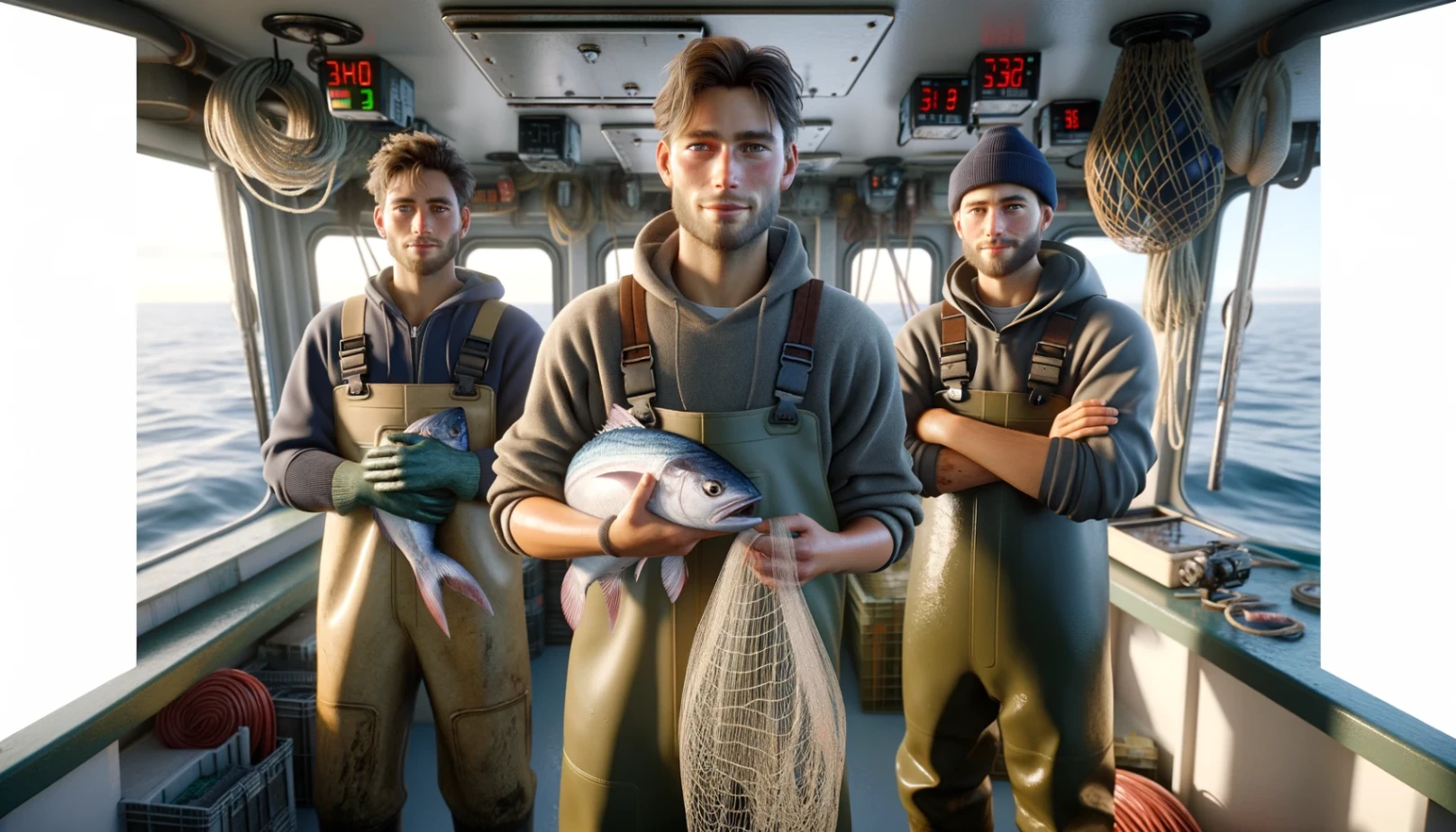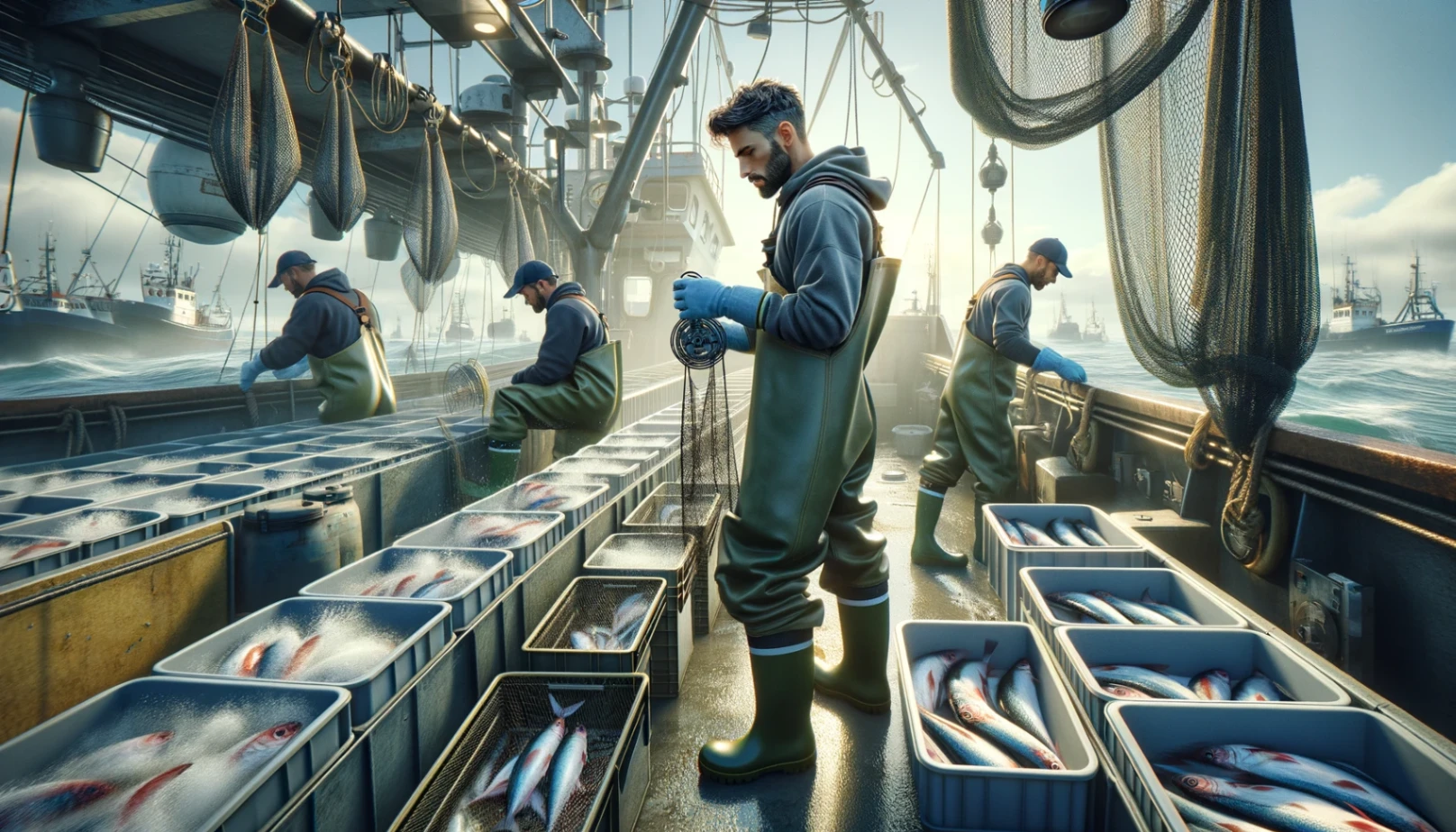In the world of employment, commercial fishing stands out, offering wages of $15 to $25 per hour and accessible opportunities for all skill levels.
Explore this industry's potential, regardless of your experience, as we delve into commercial fishing.
The Scope of Commercial Fishing Jobs
The commercial fishing industry presents many opportunities for individuals interested in various roles.
These roles cater to diverse skill sets and preferences, making it an inclusive field. Some of the critical positions within this industry include:
- Deckhands: Deckhands manage nets, sort catches, and maintain equipment for hands-on experience.
- Processors: Processors ensure top-quality catches through precise and speedy cleaning, gutting, filleting, and packaging.
- Skippers (Captains): Skippers oversee operations, safety, and maintenance, needing extensive experience and leadership.
- Engineers and Mechanics: Maintain vessel machinery and engines for safety and productivity.
- Fishery Biologists: Sustain fish stocks by collecting data, studying ecosystems, and aiding in fisheries management.
- Seafood Inspectors: Assess fish and seafood for quality, freshness, and safety compliance.
- Fishmongers and Distributors: Bridge the gap between catch and consumers by selling and distributing seafood.
These roles showcase the industry's diversity and are accessible to individuals with varying skills and interests, making it an exciting field to explore.

Qualifications and Skills Needed
To excel in commercial fishing, specific qualifications and skills are essential. Here's a concise list of what you need:
- Physical fitness and stamina
- Strong work ethic
- Teamwork and communication
- Adaptability and problem-solving
- Attention to detail
- Basic knowledge of fishing equipment
- Understanding of safety protocols
- Willingness to work in challenging conditions
- Patience and resilience
- Ability to follow instructions
Salary Range and Benefits
Here's the breakdown of the wage range of $15-$25/hour in the commercial fishing industry:
- Entry-Level Positions: Workers with little experience often start at the lower end of the wage scale, around $15-$18 per hour.
- Experienced Crew Members: Those with industry experience and a track record can earn between $18-$22 per hour.
- Skilled Roles: Due to their expertise, Skippers, engineers, and leaders earn around $20-$25 per hour.
- Location and Seasonal Variations: Wages vary by location and season; remote or challenging conditions may offer higher pay.
Additional Benefits
In addition to competitive hourly wages, commercial fishing jobs often come with valuable benefits. Here's a list of some additional perks:
- Room and Board: Many fishing vessels provide free accommodation and meals during work, reducing living expenses.
- Health Insurance: Some employers offer health insurance coverage, ensuring access to medical care, especially in remote locations.
- Bonuses: Seasonal or performance-based bonuses can significantly boost your earnings.
- Retirement Plans: Certain companies provide retirement plans or contributions to help you secure your financial future.
- Training Opportunities: On-the-job training and certification support can enhance your skills and career prospects.
- Adventure and Travel: Commercial fishing often involves traveling to different locations, offering a unique, adventurous experience.
- Camaraderie: Strong bonds and friendships develop among crew members during extended periods at sea.
- Career Progression: The industry offers pathways for career advancement, with opportunities to move up the ranks.
These benefits can vary by employer and job type, but they make commercial fishing jobs attractive beyond the hourly wage.
Challenges and Considerations
While commercial fishing offers promising opportunities, it presents its fair share of challenges and considerations. Here are some key factors to keep in mind:
- Physical Demands: The job can be physically demanding, requiring strength and endurance to handle heavy equipment and long hours.
- Weather Conditions: Fishers often work in harsh weather conditions, facing storms, cold temperatures, and rough seas.
- Seasonal Work: Many fishing jobs are seasonal, so that income may be inconsistent throughout the year.
- Isolation: Extended periods at sea can lead to social isolation, away from friends and family.
- Safety Risks: Fishing is among the most hazardous professions, with risks of accidents and injuries.
- Regulatory Compliance: Compliance with fishing regulations and quotas is crucial, with consequences for violations.
- Environmental Impact: Sustainable fishing practices are essential to protect marine ecosystems.
- Unpredictable Income: The catch's size and market prices can fluctuate, affecting earnings.
- Physical and Mental Health: Isolation and demanding work can impact mental and emotional well-being.
- Long Hours: Extended work hours are common, with some trips lasting for weeks or months.
These challenges underscore the need for preparation and a clear understanding of the demands of a commercial fishing career.
Finding Commercial Fishing Jobs
Finding commercial fishing jobs can be rewarding, but you need to know where to look:
- Online Job Boards: Explore dedicated maritime websites for job listings.
- Local Fisheries: Contact fishing companies or docks in fishing communities directly.
- Networking: Build industry connections through associations, events, and social networks.
- Crewing Agencies: Specialized agencies can match you with positions.
- Government Resources: Use government agencies for job info and certifications.
- Fishing Communities: Engage with online and in-person fishing communities.
- Job Fairs: Attend maritime job fairs for face-to-face opportunities.
- Online Forums and Groups: Participate in fishing-related online forums and groups.
- Local Ads: Check local sources like newspapers and community boards.
- Persistence: Stay committed and follow up regularly in this competitive field

How to Apply
When applying for a commercial fishing job, following a clear and organized process is important.
Here are seven essential steps to help you apply effectively:
- Find Suitable Job Listings: Explore job boards for relevant fishing positions that align with your skills and preferences.
- Review Job Descriptions: Understand the job's requirements by carefully reading the descriptions.
- Update Application Docs: Revise your resume and create a tailored cover letter.
- Complete Application: Follow the instructions to apply online or via email.
- Follow Up Politely: After applying, consider a courteous follow-up email or call to express ongoing interest.
- Prepare for Interviews: Get ready for interviews by researching the company and practicing common questions.
- Respond Promptly to Offers: If offered a position, reply promptly to confirm acceptance or negotiate terms if needed.
These steps will help you navigate the application process smoothly and increase your chances of securing a commercial fishing job.
Preparing for the Application Process
Preparing for the application process in the commercial fishing industry is crucial to stand out and secure a position.
Here's a list of steps to help you get ready:
- Update Your Resume: Ensure your resume highlights relevant skills, experience, and certifications.
- Gather References: Collect references who can vouch for your work ethic and reliability.
- Certifications and Licenses: Obtain any required licenses or certifications, such as a TWIC card or fishing permits.
- Physical Fitness: Maintain good physical health to meet the job's demands.
- Safety Training: Familiarize yourself with safety procedures and protocols, such as basic first aid and CPR.
- Research Employers: Learn about potential employers and their vessels to tailor your application.
- Prepare for Interviews: Practice common interview questions and scenarios specific to fishing jobs.
- Pack Accordingly: If you land a job, be ready to pack essentials for extended trips at sea.
- Network: Leverage your network to learn about job openings and industry insights.
- Stay Informed: Keep up with industry news and updates to showcase your knowledge.
Following these steps can increase your chances of successfully navigating the application process and securing a commercial fishing job.
The Bottomline
In conclusion, the commercial fishing industry welcomes all skill levels with hourly wages from $15 to $25, offering a diverse and rewarding career.
It's an accessible and exciting opportunity worth exploring.
Whether seeking adventure, steady income, or skill development, explore this dynamic field's potential for your future.







